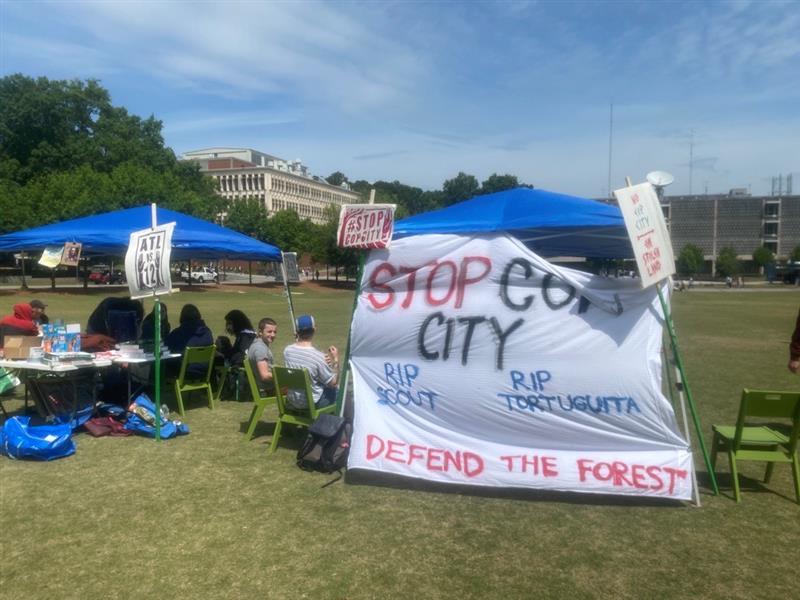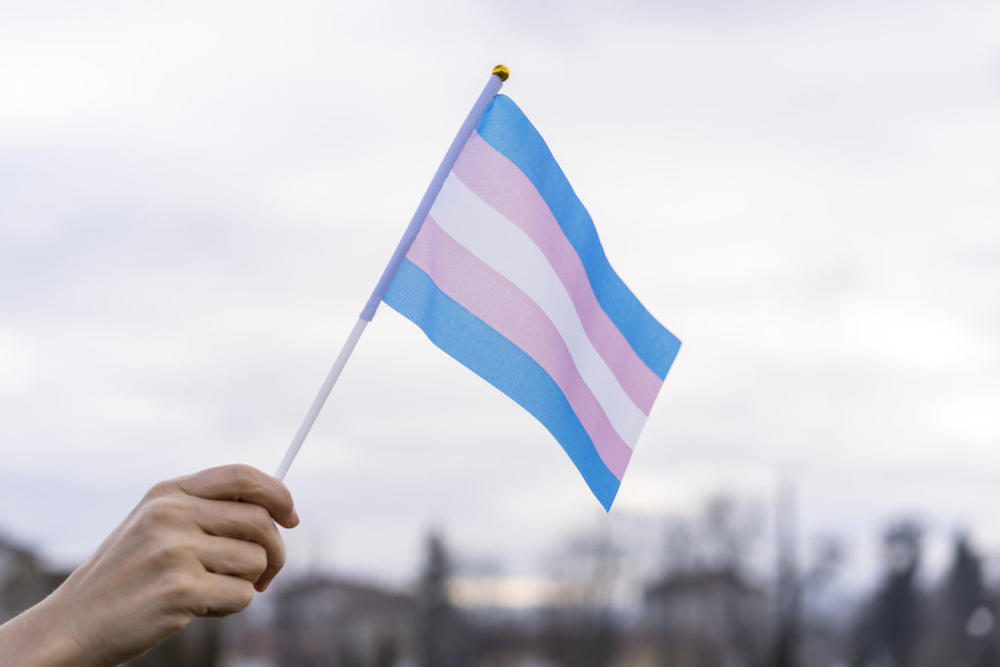
Section Branding
Header Content
Georgia Today: ACLU condemns 'Cop City' indictments; Hormone therapy ban update; Electric vehicles
Primary Content
LISTEN: On the Wednesday, Sept. 6 edition of Georgia Today: The Georgia ACLU condemns the indictment of dozens of activists opposed to Atlanta's new police training center; a judge allows Georgia to resume a ban on hormone therapy for transgender youth; and Georgia is quickly becoming a leader in electric vehicles. Can our infrastructure keep up?

Peter Biello: Welcome to the Georgia Today podcast from GPB News. Today is Wednesday, Sept. 6. I'm Peter Biello. On today's episode, the Georgia ACLU condemns the indictment of dozens of activists opposed to Atlanta's new police training center. A judge allows Georgia to resume a ban on hormone therapy for transgender youth. And Georgia is quickly becoming a leader in electric vehicles. Can our infrastructure keep up? These stories and more are coming up on this edition of Georgia Today.

Story 1:
Peter Biello: 61 people have been indicted on racketeering charges after a long-running state investigation into protests against a proposed police training center in Atlanta, Georgia. Attorney General Chris Carr brought the indictments yesterday, alleging the defendants are "militant anarchists" who have supported a violent movement. Chris Bruce of the Georgia ACLU condemned the charges, calling them politically motivated and a threat to democracy.
Chris Bruce: One of the individuals who is being charged received $15.18 in reimbursement from the Network for Strong Communities for goods to further living in the forest. This is what they're charging people for.
Peter Biello: Other charges include possessing fire accelerant and throwing Molotov cocktails at police officers. More than three dozen people charged yesterday already face state domestic terrorism charges in connection to the protests.
Story 2:
Peter Biello: A Fulton County judge has denied a request by two of the defendants in the 2020 election interference case to be tried separately from each other next month. As GPB's Stephen Fowler reports, prosecutors also laid out their expected timeline for a trial.
Stephen Fowler: Attorneys Kenneth Chesebro and Sidney Powell are two of the 19 defendants, including former President Donald Trump, charged with participating in a racketeering enterprise to overturn Georgia's 2020 election. They both requested a speedy trial and after a Wednesday hearing, will both have an Oct. 23 trial date. The Fulton County DA's office says it will take four months to present the case and over 150 witnesses for each trial that's scheduled because they have to prove a massive conspiracy.
Judge Scott McAfee: The state's position is that whether we have one trial or 19 trials, the evidence is exactly the same. The number of witnesses is the same.
Stephen Fowler: Judge Scott McAfee expressed skepticism that all 19 defendants would be tried together next month, but asked for further briefing on the idea next week. For GPB News, I'm Stephen Fowler.

Story 3:
Peter Biello: A federal judge in Atlanta is allowing Georgia to resume enforcement of a ban on hormone replacement therapy for transgender people under the age of 18. Judge Sarah Garrity put her previous order blocking the ban on hold yesterday. State attorneys had asked her to vacate her preliminary injunction because a day after she issued it, an appeals court allowed enforcement of a similar law in Alabama. Several transgender children and their parents are challenging the Georgia law.
Story 4:
Peter Biello: A zoning meeting set for tomorrow night in coastal Georgia's McIntosh County has a prominent civil rights attorney group on high alert. GPB's Benjamin Payne reports.
Benjamin Payne: The Southern Poverty Law Center says a proposed zoning amendment could drive out indigenous Gullah Geechee landowners from their ancestral homes on Sapelo Island. That's because the amendment would open up the Gullah Geechee settlement known as Hog Hammock, to new types of commercial development, including golf courses and country clubs. Miriam Gutman is an attorney with the SPLC assisting Sapelo Island's Gullah Geechee residents. T
Miriam Gutman: The community has been very, very concerned that this change is going to pass and that they will be essentially kind of forced out of their home through rising property tax, through new development.
Benjamin Payne: The zoning hearing is scheduled for Thursday evening at 5:30 at the McIntosh County Courthouse in Darien. For GPB News, I'm Benjamin Payne.
Story 5:
Peter Biello: Georgia has landed another auto parts supplier to make components for an electric vehicle plant that Hyundai is building in Southeast Georgia's Bryan County. A South Korean company, D-A-S Corporation, said today that it plans to build a $35 million manufacturing facility and hire 300 workers in nearby Candler County. Meanwhile, Georgia Southern University and Ogeechee Technical College, both in Statesboro, have signed an agreement with Hyundai to address workforce needs at the massive plant. The company plans to hire more than 8,000 employees by the time it starts producing vehicles in 2025.
Story 6:
Peter Biello: While Georgia is fast becoming a leader in building electric vehicles, the state still lags in laying the groundwork for people who drive those cars. GPB's Grant Blankenship has more on a report released today on the availability of electric vehicle charging stations.
Grant Blankenship: Those are the findings from the Southern Alliance for Clean Energy and their new transportation Electrification in the Southeast Report. Report Authors point out Georgia is second from the bottom out of six Southeastern states when it comes to spending state money on installing EV chargers. Stan Cross of the Southern Alliance for Clean Energy says the federal money the state is using instead comes with strings which keep most of the advances in cities or suburbs. He hopes that can change when people in rural areas see electric vehicles they want.
Stan Cross: So I think as those vehicles come to market, it's going to be incumbent upon all of us to make sure that rural communities are being prioritized.
Grant Blankenship: The report concludes federal spending will almost have to be supplemented by more state and local money to reach that goal. For GPB News, I'm Grant Blankenship in Macon.

Story 7:
Peter Biello: State utilities regulators are setting aside three days in December to hear arguments on how much more Georgia Power customers should pay for two new nuclear reactors at East Georgia's Plant Vogtle. The Georgia Public Service Commission approved a timeline yesterday for the elected five-member board and its staff to consider the company's rate hike request. How much more customers end up paying for the over-deadline in overbudget nuclear expansion? It will likely will resemble a settlement with several environmental groups announced last week. Under that deal, the average residential customers monthly bill would increase by nearly $9. Georgia Power agreed to spare the utility's customers more than $2 billion of the $10 billion that it's costing the company to build the new reactors.
Story 8:
Peter Biello: The Georgia Ports Authority says it will donate $6 million in coming years to improve affordable housing options in Savannah and neighboring communities. Savannah officials said yesterday that it'll be the largest outside contribution to the Savannah Affordable Housing Fund since its founding a dozen years ago. The authority's funding primarily will go toward home repairs for low- and middle-income residents, as well as down payment assistance for first-time homebuyers.
Story 9:
Peter Biello: An Ohio couple is returning to Atlanta for the Music Midtown Festival. They're bringing awareness to a serious issue, even as people enjoy performances at one of the city's most popular events. GPB's Ellen Eldridge reports.
Ellen Eldridge: The people who need naloxone most are the least likely to have it. That includes police and fentanyl overdose victims. William Perry founded This Must Be The Place with his wife two years ago. He says people aren't likely to buy and carry naloxone since the overdose reversal spray is expensive.
William Perry: You're walking into a pharmacy, even now that Narcan is going over the counter, and spending, you know, $60, $80, $100, depending on your location. People don't want to do that. They're just not going to.
Ellen Eldridge: Perry says in addition to donating Naloxone, he talks to concertgoers about fentanyl poisoning. The festival takes place Sept. 15 through 17 in Piedmont Park. For GPB News, I'm Ellen Eldridge.
Story 10:
Peter Biello: Georgia farmers are awaiting a federal disaster declaration in the wake of Hurricane Idalia. The declaration would speed federal resources to the state's agriculture industry, including pecan farmers. University of Georgia horticulture professor Lenny Wells says the crop was among the hardest hit by the storm.
Lenny Wells: The area that's been affected probably accounts for about a third of the pecan crop in the state and I think probably within that region I would say at least a third of the crop has been affected.
Peter Biello: Pecans are a $200 million industry in Georgia.

Story 11:
Peter Biello: In 1954, the U.S. Supreme Court declared racial segregation in schools unconstitutional. Yet some schools in the South resisted desegregation. Some schools waited until the court pushed again in 1969 to integrate. Among those were the schools in Leland, Miss. Atlanta filmmaker Doug Blackman was among the first group of kids to be integrated in Leland. And for his latest film, he tracked down his former classmates to learn more about their experience of Leland's racial divide. The film is called The Harvest and is part of the PBS's American Experience series.
Doug Blackmon: Thanks for having me.
Peter Biello: So you were part of that class of 1982. You didn't end up graduating from Leland, though, right? You moved away in your senior year, was it? Or just high school?
Doug Blackmon: Middle of high school.
Peter Biello: Middle of high school. But before classes began for you, for the class of 1982 in Leland, how segregated was that town?
Doug Blackmon: Completely. Segregation had been declared unconstitutional 15 years earlier, and it was no longer the case that a Black person couldn't walk into the public library. But for most practical purposes, the world was just as segregated as it had ever been. And obviously the church was completely white or Black. Little League baseball, every — the swimming pool; no Black person ever entered the same pool as a white person. And there was no pool for Black people. In every way, it was still as archly segregated as it had been a decade or probably 30 years before.
Peter Biello: And do you remember as a child, any talk of schools being desegregated before you entered that class for the first time?
Doug Blackmon: Absolutely none. And I can't imagine that there was any in my presence until much, much later. I was aware at some very early point that something was going on. There was some tension or drama in the air and, you know, a child could perceive that. But across the board, for me and many of my classmates, the adults simply weren't talking openly about any of the stuff that was happening. And so we approached the first grade with probably the same kind of naive excitement that almost every first grader would.
Peter Biello: Yeah, you would have been like 6 or 7, right?
Doug Blackmon: 5 or 6.
Peter Biello: 5 or 6. Okay. So that young. Well, in one part of the film, you and a variety of your classmates described what it was like as kids to start school as the first racially integrated class.
Brandon Taylor: There was no conversation about, you know, anything, you know, being different. You know, we're just going to another school, be on your best behavior, you know, like your parents will want you to.
Doug Blackmon: There were Black kids in my class that didn't strike me as surprising or any usual because it was the only thing I — it was the only kind of school I knew.
Donald Richardson: From a 5-year-old perspective, there was no difference in the children, Black or white.
John McCannlish: I didn't really had any awareness of the racial integration. I think I was just trying to make new friends.
Jesse King: It was a very first-time experience, experienced the experience of interacting with the white students at the school, and I thought it was cool.
Peter Biello: That was Brandon Taylor, you, Donald Richardson, John McCannlish and Jesse King. So for the children, Doug, it seemed like it's just a normal thing to do. They want to go to school. They want to make friends and have fun and learn. But for the adults — the adults in the community found a way to maintain a form of segregation through private schools. Can you tell us a little bit about what happened there?
Doug Blackmon: In almost every place in Mississippi and all across the South. Every place where there was a substantial Black population, including cities and towns all over Georgia and including Atlanta at that stage of the game, many white people were still desperate to preserve segregation in some form, though by that time they had begun to figure out that the language of overt racism was ugly in the in the ears of most other Americans. And so they were not quite calling it a defense of segregation and began to use other words that we're more familiar with today to try to talk about why they suddenly were opening private schools in hundreds and hundreds of places all across the Deep South. And so a significant contingent of white children and white families who a year earlier would have shown up on that same day, the beginning day of school, all the white kids over here, all the black kids on the other side of town — about half of the white folks in my hometown did not show up on that day.
Peter Biello: Your film spent some time talking about whether desegregation was successful. And I guess it depends a lot on how you define success. And some of the folks you interviewed said, yeah, it was very good that individuals got to know each other because you can't hate what you know. And if you — if you get to know people, if they help you with your algebra homework, for example, as one person mentioned in the film, you know, the hate kind of evaporates in that kind of scenario. But that's good. But there were limitations to what desegregation could do. And one person you interviewed, Pamela Pepper, spells those out.
Pamela Pepper: Looking back. I have sadness now that I didn't have then about the fact that there were wonderful social relationships between 8:15 and 3:30 and at football games and working on homecoming floats and whatever else. But they didn't extend beyond that between Black kids and white kids.
Peter Biello: In other words, school was a safe space in some ways, but Black kids still to some extent felt uncomfortable going into white neighborhoods, for example, to see their white friends because they — they knew the risks involved.
Doug Blackmon: The reality was that that no one was encouraging — whether white adults or Black adults — no one was encouraging that there be any kind of interaction between Black kids and white kids after the school bell rang at the end of the day. Those were common sorts of things where where people — where children could simply feel that there was something about getting together beyond the school day that was not going to be liked by their parents, even if their parents were among the folks who were quote unquote, committed to public schools and committed to race to civil rights and and such. There was just a fear that something unexpected would happen.
Peter Biello: Overall, what do you hope viewers take away from your film?
Doug Blackmon: At the end of the film, we — without saying the words, we ask the question: Was it worth it? And we're talking about what happened to that class, what happened to that town. But we're also asking that question about all of America, because here we are in a time when so much progress has been made. Our society and our country is so different, so much better in terms of race, even with all the problems we still have. So much progress has been made over the last 30 years, over the last 50 years. And for me, that's the most fundamental paradox of our society. So much progress and yet still so vulnerable. And so we ask that question, the things that we did, the experiences we had, the sacrifices some people made, all of those things. Were they worth it, given that where we've ended up? And I think that my answer to that question, at least at the end of the film, is that, yes, it was worth it. Tremendous things were accomplished, particularly in the individual lives of those who experienced what we did. And it was working even with its failures. In some respects, it was working. It's simply that as a society, we gave up. We gave up too soon. We gave up when it felt too hard. But those are the ways, the things that we experience. Those are the ways that a different kind of society could still perhaps come to exist.
Peter Biello: Well, Doug Blackmon, thank you so much for speaking with me about your film. Really appreciate it.
Doug Blackmon: Thanks for having me.
Peter Biello: American Experience: The Harvest will premiere in Atlanta at the Rialto Center tomorrow at 6:30 p.m. You can also see it on GPB-TV on Tuesday, Sept. 12 at 9 p.m.

Story 12:
Peter Biello: In sports, 20-year-old Atlanta native Ben Shelton reached his first Grand Slam semifinal yesterday by beating Frances Tiafoe at the U.S. Open Tennis Championships in a back-and-forth contest filled with huge hitting by both. The matchup was the first major quarterfinal between two African-American men in the Open era, which dates to 1968. And Coco Gauff, who was raised in Atlanta, dealt just fine with the heat, the humidity and a big-hitting opponent to defeat Jelena Ostapenko yesterday, becoming the first American teenager to reach the Final Four at Flushing Meadows since Serena Williams in 2001. Also, Delta Air Lines is hiring former football star Tom Brady as a longtime strategic advisor. The Atlanta-based airline didn't disclose the financial terms of the agreement. A statement from the company says the former New England Patriots quarterback will help with marketing and employee training. And finally, baseball is a strange game. And we know this because sometimes statistically, the best team in baseball can lose to the statistically worst. Last night, the Atlanta Braves, the team with the best record in baseball, lost to the Saint Louis Cardinals, which is ranked 26th out of 30 MLB teams. Final score was 10 to 6. The Braves hit four home runs, but so did the Cardinals, matching the most they've given up in any one game this season. Manager Brian Snitker:
Brian Snitker: We play enough games, all that kind of stuff's going to happen. And it's just, you know, one of them things.
Peter Biello: Pitcher Michael Soroka gave up five runs over three innings and was put on the injured list after the game for numbness in his fingers. Snitker says the numbness is, quote, "probably a big deal." Soroka also took the loss back in May to the league's worst team in baseball, the Oakland Athletics.
Peter Biello: And that's it for this edition of Georgia Today. If you want to learn more about any of these stories, visit GPB.org/news. And if you haven't subscribed to this podcast yet, I highly encourage you take a moment and do it now. That way we will pop up automatically in your podcast feed tomorrow afternoon. If you have feedback, we are all ears. Send to us by email. The address is GeorgiaToday@GPB.org. I'm Peter Biello. Thanks again for listening. We'll see you tomorrow.
---
For more on these stories and more, go to GPB.org/news.
Read the latest updates on the Georgia indictments here.



